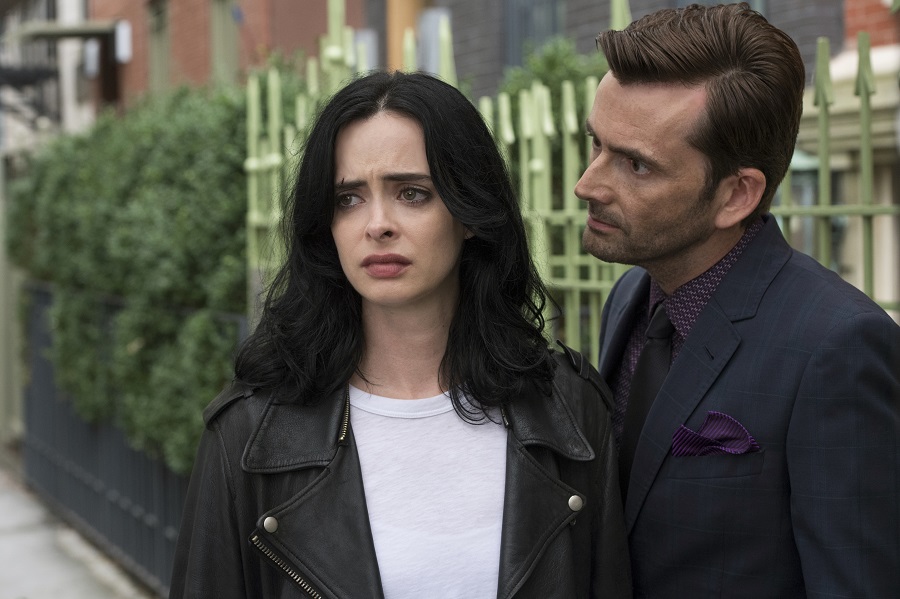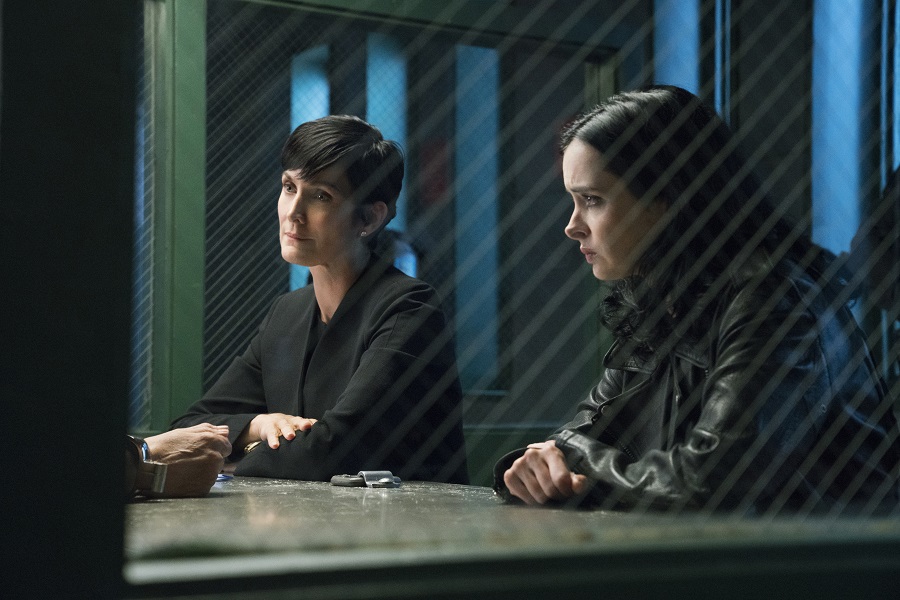Netflix UK binge review: Jessica Jones Season 2 (Episodes 9 to 13 – spoilers)
Review Overview
Krysten Ritter
8Carrie-Anne Moss
9The Ending
6Tom Bond | On 26, Mar 2018
Warning: This contains spoilers for Jessica Jones Season 2. Not caught up? Read our spoiler-free review of the opening episodes here. Already seen the series? Read Ambition, anger, and the complexity of female power in Jessica Jones
Most mainstream superhero stories deal with morality in absolutes. Save for the double-header of Captain America: The Winter Soldier and Civil War, it’s normally blindingly obvious which side is in the right.
In its second season, Jessica Jones asks some tough questions about what we believe to be the norms of good and evil, particularly within the tropes of a superhero story. As our lead and super-powered protagonist, normally Jessica would be unquestionably good, but in this series, she is forced to confront the consequences of her actions, which, despite her generally good intentions, don’t always end up for the best.
Take, for example, the scene in Episode 12 where she tries to protect Trish from her mother Melissa’s violent revenge. Jessica crosses paths again with cops Costa and Sunday, and, through little fault of her own, Sunday ends up dead. As Costa cruelly retorts in the aftermath: “Hey Jones, don’t try and be a hero. It’s not you.” Jessica is regularly placed between a rock and a hard place in one of the strongest narrative themes of this season, with her heroic intentions being constantly undermined by her understandable but selfish moral judgement to protect her mother.
All Jessica has ever been doing, across both series, is fighting for a normal life. But her powers and the baggage they bring with them keep getting in the way. Jessica has always been a pragmatist on the outside, doing things for the greater good. She murdered Kilgrave, despite her revulsion at the act, because she knew he would only continue hurting others if he was left unchecked. She is faced with a similar choice when her mother is on the run, burdened with the knowledge that her rage is uncontrollable and will surely lead to more deaths.
The difference here is Jessica’s emotional side, which she has always fought to keep hidden. The return of her mother has brought into sharp relief what Jessica didn’t even realise she was missing: the unconditional love and dedication that only a parent can bring. Her tender side has also been slowly revealed through her burgeoning relationship with Oscar (J. R. Ramirez), the improbable combination of superintendent, convicted forger and sensitive painter. Some moments in their relationship have felt gratuitous, a convenient plot device purely to reflect Jessica’s emotional growth, but the chemistry between Ritter and Ramirez is undeniable.
If Jessica has been forced to reconsider exactly who her enemies are, then the audience have as well. Normally, the introduction of a super-powered murderer with anger management issues created by a shadowy corporation of unethical scientists would be a no-brainer of villainous intent. But, as we learn more about Dr Karl Malus and IGH, we learn that while their experiments were unethical, they were conducted with the primary intention of saving Jessica and Melissa’s lives. They may have been cursed with ferocious powers, but, in the aftermath, Karl did everything he could to look after Melissa and guide her back towards a normal life.
This moral grey area plays to the strengths of the show’s ensemble, with several episodes creating such a broad debate of opinions and perspectives that Jessica is overshadowed by those around her. That’s not a criticism when the subplots are as good as that given to Carrie-Anne Moss as heartless lawyer Jeri Hogarth. If Jessica’s arc is about learning to see the good in surprising places, Jeri’s is about finding the worst in people when she needs it the most. Moss is on career-best form, revealing signs of weakness and naïve hope in the façade of this previously unstoppable powerhouse. Diagnosed with ALS and given an indeterminate but brief sentence before the inevitable hits, Jeri has a typically bullish response, immediately searching for any alternative means to cure the incurable.
Again, you’d expect to see IGH as the villains, but when their experiments create a healer with the power to cure terminal illness, surely the means justify the ends? If only it were true. Jeri is gut-punched by a double-cross that always felt inevitable, and responds with her usual ice-cold conviction. It’s hard to love a character this heartless, but it’s very easy to admire her. As she warns in a threat that could sum up the entire show: “You should be very afraid of the woman who has absolutely nothing left to lose.”
At the death, Jessica is faced with a simple dilemma. Run away with her mum, keep her rage in check, and enjoy the familial love she’s been denied her entire adult life; or, do the right thing, turn her in, and deprive herself of the love it took her so long to find. The resolution is ultimately disappointing. Just as Melissa was accepting that she needed to surrender and let Jessica live her own life, their reconciliation is interrupted by a bullet from Trish Walker.
Trish has been an unpredictable joker thrown around the plot in Season 2, and rarely to good effect. The same is true here, shooting down an authentic and positive moment of dramatic resolution in favour of short-term thrills and future volatility. Sure, Trish murdering Melissa complicates all the existing relationships heading into a future season, but it feels like the wrong ending to a fairly nuanced and moving dynamic between Jessica and her mum.
Thankfully, Jessica isn’t quite back at square one after losing her mother. She’s learnt something from her newfound emotional vulnerability this season, continuing her burgeoning relationship with Oscar in the final scenes. Meanwhile Malcolm teams up with rival PD, Pryce Cheng, in a move towards the dark side, and a potentially super-powered Trish attempts to make amends. Season 2 has added more complexity and depth to an already strong ensemble, going further into exploring the show’s themes of power, control, consent, and murky morality.
Watch along with our spoiler-filled binge reviews of Jessica Jones Season 2.
Jessica Jones: Season 1 and 2 is available on Netflix UK, as part of an £9.99 monthly subscription.
























